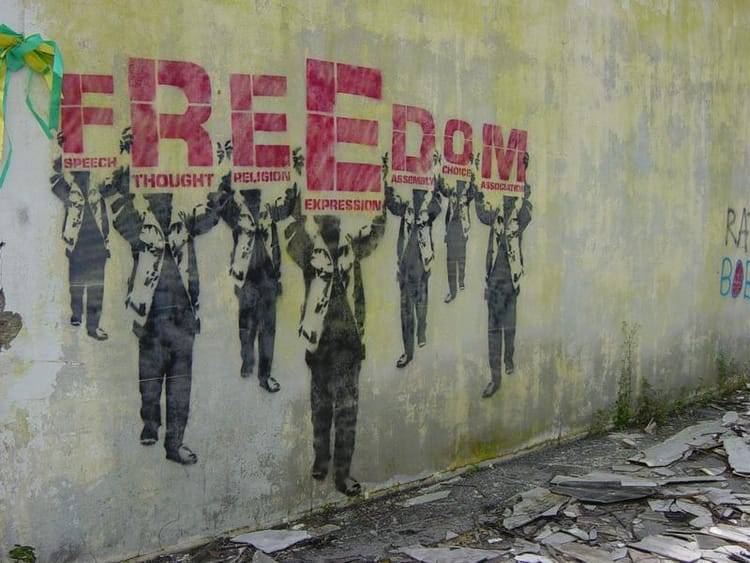What Is the Common Good, Who Controls It, and Why Is It Difficult to Define?

Nurturing harmony: exploring the fragile essence of the common good.
How can we define a common good for all people while cultivating and accepting differences?
Let’s start with what the common good is not about.
The common good is not a fairy tale or a classic story of good triumphing over evil. The common good is more like a steady stream, gradually eroding obstacles that lay naturally in its path. It doesn't seek balance between good and bad, but rather explores the space in between.
Have you ever heard of the “common bad”?
As an expression, “The common good” is problematic.
Good versus bad is a binary. These polarities cannot exist or be understood except in relation to each other. Nor is there an exact middle or balance between the two. Balance is also an illusion in that it is never fixed, but rather an action.
Imagine a teeter-totter on a children’s playground.
Watch two children playing in a playground on a teeter-totter, up and down, playfully trying to find a perfect balance when they are both feet off the ground, looking over at each other. That moment is fleeting as one child slowly rises, while the other descends. The only part of the structure that fosters balance is the fulcrum, that mechanism in the middle of the board that allows it to move up and down at the mid-point.
The common good is like the fulcrum of a teeter-totter, forever supporting the instability of the board and whatever is pushing down on either side — good and bad, strength and weakness, or hatred and compassion.
The common good doesn't revolve around notions of equality or equity.
Instead, the common good is about supporting a harmonious balance that connects us all.
Its essence can't be found in rule books as a prescription or within rigid ideologies that dictate behaviour. Nor is the common good the dictate of a single person. Should any one person say that what they are telling you to do, or forcing you to do, is for the common good, they are acting instead out of self-serving interest.
In one of the great sourcebooks of Taoism, "Wen-Tzu: Understanding the Mysteries," we read a passage in verse 40 that describes the self-awareness and leadership required to cultivate the common good:
“Brilliance and broad knowledge are preserved by ignorance; learning and eloquence are preserved by frugality; martial power and courage are preserved by fear; wealth, status, and greatness are preserved by restriction; benevolence extended to all the world is preserved by deference.” [1]
What does this mean in practical terms?
The final lines from verse 40 provide an answer, but one that requires further elaboration.
“These five things are the means by which kings of yore kept the world. Those who take to this path do not want fullness, only by not being full can they use fully and not make anew.”
What the Wen-Tzu means by fullness, is not daring to be self-satisfied or self-serving.
This type of egocentric behaviour is diminishing instead of expansive and connecting with others. Not wanting fullness — or fullness of self — is a form of yielding, which is not giving up or giving away. Instead, yielding is like the metaphor of water above easily flowing around obstacles with no mind to them.
The Common Good in Practice
Contemplating verse 40 of the Wen-Tzu unveils the fluid meaning of the common good.
1: Preserving Knowledge
“Brilliance and broad knowledge are preserved by ignorance”
We don’t all possess extensive knowledge, nor does anyone know everything, but everyone has unique insights to share. It’s knowing that we don’t know everything that cultivates curiosity and collaboration.
For example, Indigenous peoples in countries all over the world hold cultural and historical practices and wisdom that can help us in how we manage preservation and waste reduction.
2: Learning & Eloquence
“learning and eloquence are preserved by frugality”
Frugality from a Taoist perspective is understood as knowing when you are learning only for the sake of learning, instead of learning to improve or solve a problem.
The person who is forever studying without application knows less from a practical perspective than the person who puts knowledge into practice. Over time, practice becomes a skill, and skill takes on the form of eloquence. Information is imparted to others for the common good in the form of eloquent teaching.
3: Courage & Martial Power
“martial power and courage are preserved by fear”
The idea that power and courage are preserved by fear is intriguing. It implies holding on to actions or behaviours that prevent harm to others. The common good involves a complex interplay of actions, behaviours, beliefs, and values that maintain a delicate harmony among people.
Courage, when grounded in personal strength, avoids recklessness.
Martial power, while potent, must be managed and controlled to prevent chaos.
4: Wealth & Restriction
“wealth, status, and greatness are preserved by restriction”
Without restraint, the wealthiest 0.1% would amass even more power, undermining the common good. This threatens our collective welfare.
We already see this in action with the myth of inflation. A corporation will tell you that they have to increase their prices because of expenses or supply chain issues — yet their profit margins simultaneously increase.
Restriction in extreme wealth creation safeguards against extreme inequality and supports the idea of a universal common wealth to be shared and accessible for the common good.
5: Benevolence and Deference
“benevolence extended to all the world is preserved by deference”
Benevolence is the quality of well-meaning, and more so of kindness. This speaks to the simple respect for human dignity and the belief that every individual merits respect.
Deference means humble submission and respect. In this context, deference means supporting or elevating someone with kindness; even yielding to their need for respect, depending on the equity or inequality of the situation.
Deference acts as a reminder of humility with benevolence. Humility allows kindness without the need for recognition.
The Common Good as a Shared Ideal
The common good is cultivated by acceptance and a lack of prejudice toward others.
The common good exists as part of human nature. Societies have been built around this shared ideal, aiming to survive and thrive harmoniously. To flourish, the common good must be nurtured both communally and at the individual level.
The dominant behaviour that cultivates the common good is acceptance, which fosters feelings of belonging and respect.
However, when the common good is suppressed, the dominant feeling is fear, which eradicates belonging.
Contemporary Challenges to the Common Good
Currently, we witness extreme tensions among tribes, communities, and nations. Superiority claims divide countries and radicalized groups, often rooted in fundamentalist ideologies. Wars throughout history have resulted from the loss of the common good.
A striking contemporary example is Vladimir Putin’s invasion of Ukraine. His actions, far from preserving courage or martial power in a balanced manner, stem from the fear of democratic reforms encroaching on Russian minds. Even if this is a reaction to NATO expansion, Putin's disproportionate wealth and power-seeking jeopardize the common good of humanity.
Embracing Diversity: The problem with anti-LGBTQ legislation.
Uganda is the current example par terrible for enacting grossly homophobic mortality laws, making any shade of queer near or punishable by death.
How is killing queer people, or any other group, good for the common good?
The Christian right-wing Evangelicals and Dominionists in the United States are just as problematic. Should they gain any more political power, they will operate from the same kind of anti-common good, hateful, exclusionary mindset, imposing laws to eradicate all "unnatural behaviour" [2] and differences, which includes not just people and race, but also belief systems.
My home of Canada is not immune to the distraction of politicization that appears to be for the common good of “saving the children” but is only a self-centred agenda.
The common good is perceived as being acted upon in good faith by forcing teachers to tell a child’s parents if said child requests to go by a different name that best reflects their gender identity. Sure, parents, if they are “good parents,” have a right to know about some aspects of their children’s lives. However, is a parent entitled to determine how “their child” chooses to best fit into the social construct in which they find themselves? Do parents have the right to suppress their child’s innate nature to explore gender and sexual identities to become who they are?
Absolutely not!
The old-world example of this scenario is parents forcing their children to choose one particular profession over another or to “follow in Dad’s footsteps” and take over the family business. To deny a child the freedom to express their identity that has nothing to do with — and is not a reflection of their parents — is a suppression of the common good.
Limiting one’s natural freedom of gender and sexual identity will only result in an unhappy, dysfunctional human being who will most likely have mental health issues for the rest of their life. Unhappy, unrealized, suppressed individuals make for a very unwell society that is a virus to the common good.
Withholding is Contrary to the Common Good
Withholding is about self-preservation and selfishness, which can be at the expense of others.
Cultivation, on the other hand, promotes growth and evolution, which requires care and being tended to, like taking care of a garden. It is ultimately altruistic.
Have you ever had to hold back any part of who you are? Have you ever been forced to hold back your identity, your dreams, your natural behaviours, mannerisms or characteristics? How did that make you feel, and how did that affect your thoughts and actions towards others?
The common good is not a binary of right/wrong, or good/bad.
The common good is the awareness of the multiple influences that lead to cultivating stability and homeostasis of the qualities of dignity, acceptance, and belonging.
These are core human aspirations of all people to function as individuals and collectively — and to live with dignity, opportunity, and equity.
For the common good to work naturally, we must discern what we have in common and foster those connections.
We need to accept differences and diversity as a natural, unarguable aspect of all life on this planet.
Endnotes
[1] Cleary, Thomas, and Lao-tzu. Wen-Tzu: Understanding the Mysteries. Shambhala, 1992.
[2] A short explanation about what I mean by unnatural behaviour. Human beings are the only creatures on this planet that hate other humans, other creatures; even hating our existence with how we are destroying the planet’s ecology. Hate is the virus that kills the common good. And hate is what ultimately leads to genocide, world wars, and a serious threat to our very existence. It is not natural for us to hate others: we are taught to fear, judge, and hate others.





Member discussion